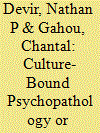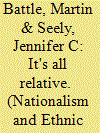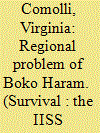| Srl | Item |
| 1 |
ID:
156427


|
|
|
|
|
| Summary/Abstract |
The distribution of material benefits to voters at election time is a widespread practice that raises the cost of campaigning and is on the increase across Africa. This article examines the consequences of the high cost of campaigning in African democracies. It argues that the prevalence of gift giving and vote buying affects parties’ selection of candidates by privileging wealthy candidates and pushing out qualified, but less-endowed candidates. This argument is supported with original data on the backgrounds of Members of Parliament from six legislatures in Benin, a successful African democracy. It shows that the number of wealthy candidates has increased substantially since the introduction of multi-party politics 26 years ago and that this trend has important implications for the quality of democracy. Using data on MP performance, the article shows that along some important indicators, wealthy candidates perform worse in office than other MPs. These findings indicate that the consequences of electoral handouts to voters are much more far-reaching than previously thought.
|
|
|
|
|
|
|
|
|
|
|
|
|
|
|
|
| 2 |
ID:
188443


|
|
|
|
|
| Summary/Abstract |
Certain aspects of Vodoun, Benin’s primary indigenous religious tradition, have been perceived by some of that nation’s Christian believers as a menacing occult reality. Many Christians report states of acute psychological distress due to fears of the forces of Vodoun. This study analyzes the strategies employed by applied psychotherapeutic science professionals to diagnose and treat such cases, with an eye toward presenting a framework for the possible amelioration of clinical outcomes in comparable instances elsewhere.
|
|
|
|
|
|
|
|
|
|
|
|
|
|
|
|
| 3 |
ID:
146125


|
|
|
|
|
| Summary/Abstract |
Fiscal sociology has alleged the existence of a mutually reinforcing effect between the emergence of representative government and effective taxation. This paper looks at Benin, a low-income country that successfully democratised in the early 1990s. It finds that Benin appears to have reinforced its extractive capacities since democratisation. However, the effect of democratisation has been indirect, while the influence of the International Financial Institutions (IFI) and the size of the country's informal sector have played a more direct role. Nevertheless, the hypothesis that effective taxation is based on a quasi-consensual relationship between the state and the taxpayers finds some confirmation.
|
|
|
|
|
|
|
|
|
|
|
|
|
|
|
|
| 4 |
ID:
156768


|
|
|
|
|
| Summary/Abstract |
Fiscal sociology has alleged the existence of a mutually reinforcing effect between the emergence of representative government and effective taxation. This paper looks at Benin, a low-income country that successfully democratised in the early 1990s. It finds that Benin appears to have reinforced its extractive capacities since democratisation. However, the effect of democratisation has been indirect, while the influence of the International Financial Institutions (IFI) and the size of the country's informal sector have played a more direct role. Nevertheless, the hypothesis that effective taxation is based on a quasi-consensual relationship between the state and the taxpayers finds some confirmation.
|
|
|
|
|
|
|
|
|
|
|
|
|
|
|
|
| 5 |
ID:
094432


|
|
|
|
|
| Publication |
2010.
|
| Summary/Abstract |
Benin has held several rounds of free and fair presidential and parliamentary elections since 1991, but little is known about how the individual citizens of Benin cast their votes and why. We created a model to test what factors-social, economical, and political-impact individual support for certain candidates, using the Afrobarometer survey. We explored contextual factors, such as concentration of ethnic group in respondent's area, by marrying census data to the Afrobarometer's individual-level data. We found that different candidates appeal to voters for different reasons, and that ethnicity alone is usually not enough to explain support for a candidate. Moreover, we found that when ethnicity is a factor, having a concentration of the ethnic group in your region can enhance the effect of ethnicity on political preferences.
|
|
|
|
|
|
|
|
|
|
|
|
|
|
|
|
| 6 |
ID:
141131


|
|
|
|
|
| Summary/Abstract |
‘Boko Haram is a typical example of small fires causing large fires’, declared retired general Muhammadu Buhari in his inaugural speech as Nigeria’s new president on 29 May 2015. The analogy was apt. From its inception in the early 2000s, the group has evolved from an isolated, broadly non-violent sect to a brutal, Islamist insurgency engaged in terrorism and criminality.
|
|
|
|
|
|
|
|
|
|
|
|
|
|
|
|
| 7 |
ID:
193267


|
|
|
|
|
| Summary/Abstract |
The party system literature has generally paid little attention to whether traditional beliefs have any impact on voters’ electoral behavior and the stability of party systems. The purpose of the present study shows that the stability of party systems and the pervasiveness of traditional beliefs go hand-in-hand. This article is expected to advance the scholarly understanding of the political consequences of traditional beliefs by showing that voters who hold traditional beliefs or engage in traditional practices are not simply less likely to have pro-democratic attitudes or have a greater appreciation of dictatorial rule, but also more likely to vote for ruling parties in elections. The evidence presented in the article sustains a basic claim; namely, that the pervasiveness of traditional beliefs in Togolese society should be regarded as one of the determinants of the party system's stability.
|
|
|
|
|
|
|
|
|
|
|
|
|
|
|
|